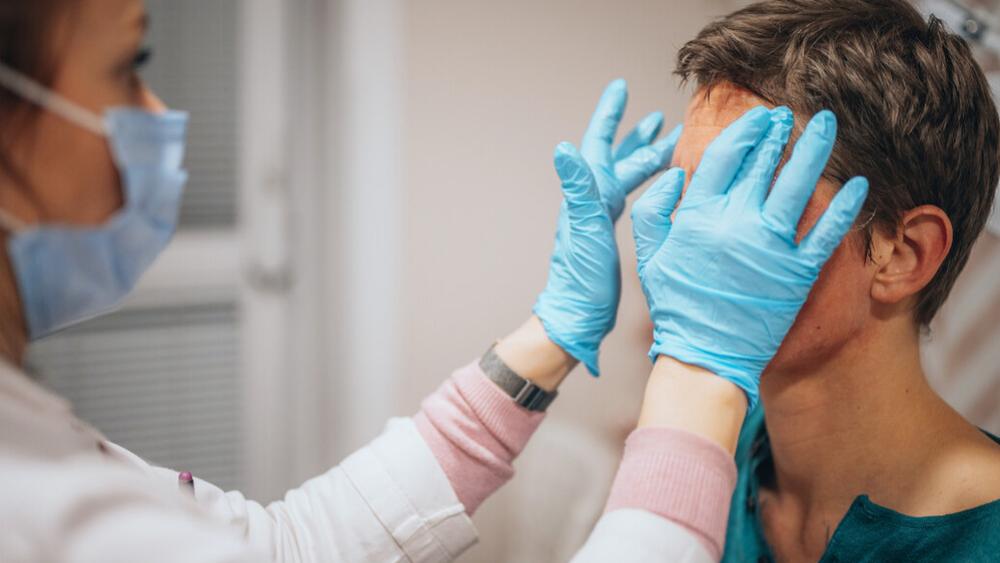





Family Health
Sunscreen, skin checks and more: Methodist dermatologist answers common questions
Published: April 2, 2024


Tomas Huerta, MD, a dermatologist with Methodist Physicians Clinic, addresses common questions that people have about sun protection.
Is a higher SPF better? Lotion vs. spray? What do I really know to keep my family safe?
When it comes to sun safety, it’s important to do the best you can. It's nearly impossible for fair-skinned people to avoid all sun damage, so focus on the important points.
First, avoid getting sunburns. When the sun causes your skin to turn red and then peel, a significant amount of damage has been done.
Applying an even coating of SPF 30 to sun-exposed areas every 60-90 minutes while outside should be sufficient, but you may need to do this more often if you’re sweating or getting your skin wet. Using a higher SPF blocks a marginally higher amount of UV rays, but I tell my patients to aim for a minimum of SPF 30.
Spray sunscreens are acceptable, but they should be rubbed in after being sprayed on. On areas not exposed to the sun, I strongly recommend wearing UPF-rated clothing and hats, which serve as physical blockers that offer more protection than regular clothing.
What do people need to know about the UV index?
The best way to think about the UV index is that it's a measure of how "strong" the sun is that day. It's a scale that looks at many factors – not just temperature or cloud cover – so it's best to think of it as its own unique number.
People who are sensitive to the sun should increase their usual sun protection measures on a day with a high UV index. Taking precautions on a high UV index day can help keep you safe and comfortable while decreasing your risk of skin cancer.
What’s the best way to protect children 6 months and younger? They’re too young for sunscreen, right?
I always remind parents and young patients that the skin they have now is the skin they’ll have for the rest of their lives, so it’s never too early to be proactive about protection.
Children 6 months and younger should be kept out of the sun with the help of physical blockers (tents, hats, staying inside, etc.). They are too young to wear sunscreen. After 6 months of age, the best option is still to use physical barriers to defend kids from the sun, but it’s generally acceptable to also use a mineral-based (titanium dioxide or zinc oxide) sunscreen.
The face, back, chest and neck seem like hot spots for concerning moles, spots and growths. Are there other areas of my body I should be keeping an eye on? What should I know about self-exams?
Anywhere you have skin, there’s potential for a concerning spot to appear. I recommend that most of my patients check their skin once a month. A nice way to do this (and see difficult areas like the back) is to set a reminder for a monthly "mole date" with your partner to look over each other's skin. After a couple times, this should go fairly quickly. The idea is to gain some familiarity with your spots, whether there are many or few, so that when something does change or a new spot appears, you recognize it and can alert your provider.
Anything that’s growing, changing, painful, bleeding or itching should be evaluated. New spots or "ugly ducklings" that don't look similar to other spots on your skin are also concerning.
Who should be having a regular skin check with a provider?
If you don’t have a history of skin cancer but are concerned, you should ask your primary care provider if a regular check is necessary. A history of sunburns or tanning bed use, a family history of skin cancer, a significant number of moles and other factors may put you at higher risk for issues and necessitate regular skin checks by a dermatologist.
What haven’t we asked that people should know about this topic? What’s on your mind after caring for so many patients?
The biggest danger to people's skin is neglect.
Making small changes to daily activities like moisturizing after a shower or applying SPF 30 or greater after washing your face can help you to avoid running into many skin issues. And when there’s an issue, don’t ignore it. Any spot that's changing, not healing or continuing to cause symptoms needs to be evaluated.
Unfortunately, unhealthy skin practices over time can cause serious issues. Long-term skin health is a marathon, not a sprint.
More Resources
- Schedule an appointment with a Methodist dermatologist.
- Learn about the do's and don'ts of winter skin care.

